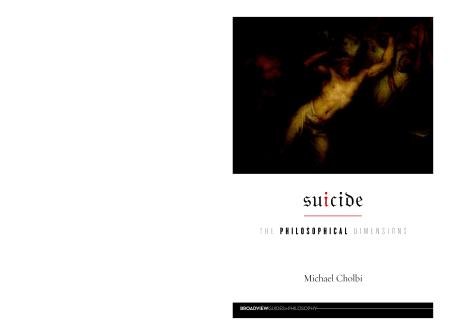Suicide: The Philosophical Dimensions By Michael Cholbi Broadview Press, August 2011 ISBN: 9781551119052 
Suicide is still a strange and puzzling phenomenon, as the shock that greeted Gary Speed’s recent death has shown.
Even though suicide is a common cause of death – about a million people kill themselves each year, while a hundred million or so will make the attempt – the impact on those close to the deceased is usually devastating. Michael Cholbi’s book presents an overview of philosophical thinking around suicide. He looks at the nature of suicide and asks whether it can ever be right to kill oneself, or indeed to assist someone to do so. His outline of the arguments and issues is perspicacious and rigorous and, where controversies and complexities arise, he makes his own views clear. After a brief introduction, the author arrives at a descriptive, non-judgmental definition of suicide as ‘intentional self-killing’. He does this by reference to a number of typical cases. This takes in cases that one could well categorize as heroic, for example: a soldier falling on an enemy grenade, smothering it completely, to save the lives of his fellows. Chapters 2-4 look at matters from the viewpoint of a person contemplating suicide: is it right or wrong? Can it even, in some circumstances, be an honorable act or a duty to kill oneself? On the one hand, you could say that an individual’s life is his own and he should be able to end it when he wants. Against this, there is the mainstream Christian view (contra the Donatists) that life is the property or gift of God, and that the commandment ‘Thou shalt not kill’ extends to one’s own self, as well as others. There are also a number of secular arguments against suicide. Our life is a social good, since we don’t live in a complete vacuum (‘No man is an island…’ and all that). We owe something to others: to our family and friends, to the wider society. Whatever roles we have in life (say as son, father, whatever our occupation might be) they entail certain obligations. To kill oneself is to renege on these responsibilities, to betray those we leave behind. Suicide is a selfish act. The next two chapters in the book ask whether one should ever take steps to prevent suicide or, conversely, to assist the person who wants to die. Many suicidal impulses arise from irrational thinking and faulty cognition, or come into play when someone is in a vulnerable state (many suicides suffer from depression or bipolar disorder). So it is undoubtedly right to intervene to prevent suicide, though there’s the point that it should be done sensitively. You’d want to avoid any trace of paternalism. If a person is of sound mind and wants to die, is it right to assist them? Clearly, this is an issue of current concern and Cholbi goes carefully through the arguments for and against. At the end of the book, there is an Epilogue and here the author attempts to answer the perennial question, ‘Why?’ Why are people driven to kill themselves? As noted above, very often mental illness and especially depression is a factor. Sometimes people may feel themselves to be a burden to others, or they may feel that they don’t – and never will – belong. Years of rejection and social isolation often precede a suicide attempt. But to change the suicidal thought or desire to action, which for healthy individuals is something of a leap, a further ingredient is usually necessary. The tipping point might well be habituation to the experience or sight of physical pain (among the professions, dentists are particularly prone to suicide) or familiarisation with the means by which they eventually end their lives. Yet for every person who dies by their own hand, there will always be a mystery. Only the victim of the act would be able to truly provide an answer to the question, ‘Why?’ And they cannot. An excellent website devoted to reducing or preventing suicide is Means Matter. Perhaps the best website about suicide overall is Suicidology. The publisher’s description of Suicide: The Philosophical Dimensions can be read here.

